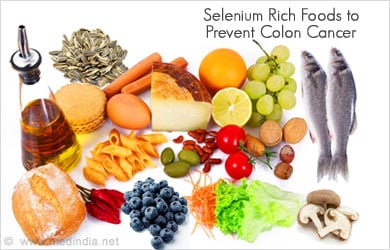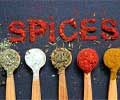About Colon Cancer
Colon cancer refers to cancer of the colon - a part of the large intestine - and is the third leading cause of cancer deaths overall. Colon cancer is preventable and treatable if detected early. Generally, men are more prone to developing colon cancer compared to women.
Most cases of colon cancer begin as small, noncancerous clumps of cells known as adenomatous polyps. Over a period of time, some of these polyps may become cancerous. Adenocarcinoma is the most common type of colorectal cancer.

Colon cancer can develop when cells of the colon are exposed to chemicals or carcinogens that damage cellular DNA leading to mutations. Cells with mutations may turn cancerous and start reproducing rapidly. The mutations and cancer can spread quickly to other parts of the body, leading to possible organ damage and death.
Diet to Prevent Colon Cancer
Diet and lifestyle have been shown to play an important role in reducing the risk and delaying the onset of many types of cancer. In particular, the risk of acquiring colon cancer may be reduced by incorporating certain types of foods and eliminating certain other foods.
Several studies have shown that a diet rich in fibre, calcium, vitamin D, selenium, vitamin E and beta-carotene reduces the risk of getting colon cancer. On the other hand, eating red meat, and foods rich in omega-6 fatty acids (found in vegetable oils like sunflower and safflower), saturated fats, pickled foods, refined sugar and alcohol increases the risk of colon cancer.
Fibre encourages the growth of good bacteria in the large intestine which bind to certain carcinogens and prevents their activation in the colon. Whole grains, pulses, fruits and vegetables are all good sources of fibre.
Calcium binds and removes bile salts, which can be converted by certain intestinal bacteria into carcinogens; thus calcium decreases the risk of colon cancer. Cumin seeds and white sesame seeds can be used for seasoning food in order to boost calcium intake.
Beta-carotene, selenium and Vitamin E are three nutrients that function as powerful anti-oxidants against cancer causing free radicals. Yellow, red and orange coloured fruits and vegetables – such as carrots, capsicums, oranges, pumpkins, and squash - are all rich in beta-carotene. Selenium rich foods include mushrooms, beans, and leafy vegetables. Vitamin E rich foods include nuts, oilseeds, vegetable oils, and whole grains. All of these foods should therefore be an integral part of a diet to prevent colon cancer.

Foods belonging to the brassica family such as cabbage, broccoli, cauliflower, brussel sprouts, and turnips, contain compounds such as isothiocyanates and indoles, which may be effective in preventing the development of tumours in the colon.
Low levels of folate are known to lead to an increased rate of mutations, that may eventually contribute to the development of cancer. Therefore eating folate rich foods such as leafy vegetables, oranges, nuts, and legumes may help reduce the risk of colon cancer.
A substantial intake of Omega 3 fatty acids found in walnuts, oily fish like salmon, mackerel; and flaxseeds may also help in counteracting the formation of tumours in the colon. Eating mono-unsaturated fatty acids (MUFA) found in peanuts, olive oil and rice bran oil in moderation is also beneficial. Phytic acid found in whole grains and pulses as well as sphingolipids found in milk and soyabean have all been shown to inhibit formation of tumours that cause colon cancer. Opting for low fat dairy products is also recommended as it helps in reducing overall fat intake.
Allium rich foods like onions, garlic, leeks, and chives are recommended as they contain organo-sulphur compounds (OSC) which can help prevent the development and progression of colon cancer. Cooking meat with onion or garlic decreases the effect of potential carcinogens, particularly heterocyclic amines, which are formed when meat is cooked.
Curcumin in turmeric, gingerol in ginger, limonoids present in citrus fruits and falcarinol in carrots are all some phytonutrients that can help in reducing the risks of developing colon cancer.
Drinking three glasses of red wine a week may cut the risk of colorectal cancer by almost 70%, as reported by researchers at the 71st Annual Scientific Meeting of the American College of Gastroenterology in October 2006. Resveratrol found in red wine has anti-oxidant properties which can combat colon cancer.

People following a high-fat, high- calorie diet have twice the risk of developing colon cancer compared to those who follow a low-fat, low-calorie diet. Switching from a diet high in refined foods, sweets, fried foods and red meat to a diet high in whole grains, fruits, vegetables, legumes, and fish can prevent the onset of colon cancer.
High intake of sugar decreases the proper functioning of the immune system, thereby resulting in the inability of the immune system to detect and destroy cancer cells.
In short, following a dietary pattern consisting of fibre-rich whole grains and pulses, soy foods, dairy products, fruits (blueberries, apples and grapes in particular), cruciferous vegetables like broccoli, cabbage; allium rich foods like onion and garlic and cold water fishes (salmon, mackerel, herring, cod) significantly cuts down the risk of colon cancer.







